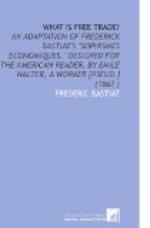Through the journey of life, in the long series of days from the cradle to the tomb, man has many difficulties to oppose him. Hunger, thirst, sickness, heat, cold, are so many obstacles scattered along his road. In a state of isolation he would be obliged to combat them all by hunting, fishing, agriculture, spinning, weaving, architecture, etc., and it is very evident that it would be better for him that these difficulties should exist to a less degree, or even not at all. In a state of society he is not obliged personally to struggle with each of these obstacles, but others do it for him; and he, in turn, must remove some one of them for the benefit of his fellow-men. This doing one kind of labor for another, is called the division of labor.
Considering mankind as a whole, let us remember once more that it would be better for society that these obstacles should be as weak and as few as possible.
But mark how, in viewing this simple truth from a narrow point of view, we come to believe that obstacles, instead of being a disadvantage, are actually a source of wealth!
If we examine closely and in detail the phenomena of society and the private interests of men as modified by the division of labor, we perceive, without difficulty, how it has happened that wants have been confounded with riches, and the obstacle with the cause.
The separation of occupations, which results from the division of labor, causes each man, instead of struggling against all surrounding obstacles, to combat only one; the effort being made not for himself alone, but for the benefit of his fellows, who, in their turn, render a similar service to him.
It hence results that this man looks upon the obstacle which he has made it his profession to combat for the benefit of others, as the immediate cause of his riches. The greater, the more serious, the more stringent, may be this obstacle, the more he is remunerated for the conquering of it, by those who are relieved by his labors.
A physician, for instance, does not busy himself in baking his bread, or in manufacturing his clothing and his instruments; others do it for him, and he, in return, combats the maladies with which his patients are afflicted. The more dangerous and frequent these maladies are, the more others are willing, the more, even, are they forced, to work in his service. Disease, then, which is an obstacle to the happiness of mankind, becomes to him the source of his comforts. The reasoning of all producers is, in what concerns themselves, the same. As the doctor draws his profits from disease, so does the ship-owner from the obstacle called distance; the agriculturist from that named hunger; the cloth manufacturer from cold; the schoolmaster lives upon ignorance, the jeweler upon vanity, the lawyer upon cupidity and breach of faith. Each profession has then an immediate interest in the continuation, even in the extension, of the particular obstacle to which its attention has been directed.




